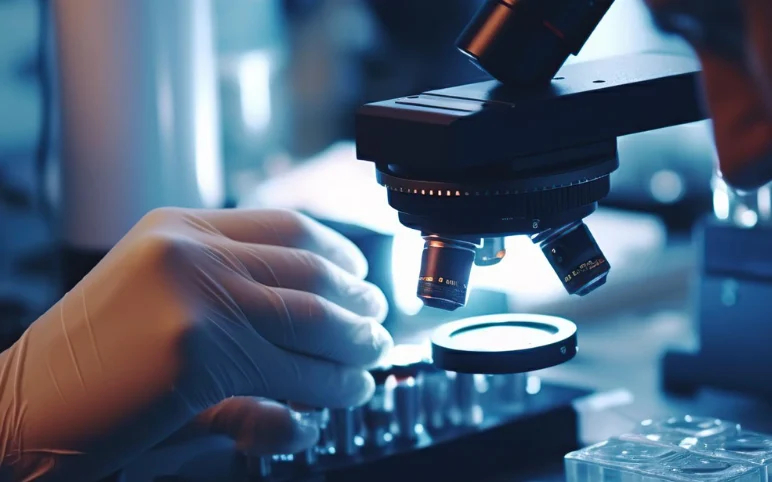Vygon Launched Neonatal Safety in India with Groundbreaking Nutrisafe2 System
On March 15, 2024, Vygon, a leader in the production and marketing of specialized medical equipment, introduced Nutrisafe2, a technological leap forward. This state-of-the-art enteral feeding device for neonates guarantees the safety and accuracy of feeding in the neonatal intensive care unit (NICU). With its introduction, Vygon tackles the serious issue of tubing misconnections, a common danger in neonatal care that can result in unfavorable outcomes, including mortality.
Using a range of tubes and catheters, newborns in healthcare settings receive medicine and other therapies. These various delivery systems’ connectors can frequently be attached to one another and are compatible with one another. Accidental delivery of air, liquid feeding formulae, or medications through the incorrect tube has resulted in adverse outcomes and fatalities.
Pavan Choudary, Managing Director of Vygon India, said, “Misconnections in enteral nutrition has been a crucial concern internationally. 40% of all misconnections are attributed to enteral clinical area, and the consequences are often serious and sometimes fatal.”
As per DelveInsight’s “Fetal and Neonatal Care Equipment Market Report”, the global fetal & neonatal care equipment market was valued at USD 7,945.25 million in 2023, growing at a CAGR of 8.07% during the forecast period from 2024 to 2030 to reach USD 12,646.97 million by 2030. The fetal & neonatal equipment market is witnessing positive growth owing to the increase in the pregnancy rate, growth in the number of preterm births, and rising prevalence of congenital abnormalities in utero are some of the factors contributing to the demand for the fetal & neonatal care equipment market. Furthermore, the rapid advancements in product development such as neonatal ventilators equipped with monitoring features is another aspect leading the fetal & neonatal equipment market to prosperity during the forecast period from 2024-2030.
Butterfly Network Launched Third-Gen Ultrasound with Remote Monitoring Ambitions
On March 18, 2024, with the release of its third-generation digital ultrasound, the iQ3, Butterfly Network, a trailblazing medical device business, made a substantial contribution to the field of medical imaging technology.
Butterfly’s semiconductor chip-based technology provides a more affordable alternative to traditional ultrasound devices, which rely on crystal-based probes. The iQ3 is priced at about $2,500, which is significantly less than similar products from companies like GE Healthcare and Philips. With real-time imagery available on a linked smartphone, this gadget gives medical workers greater mobility. With a fourth-generation chip now in development, Butterfly’s iQ3 showcases its dedication to ongoing innovation, boasting nearly twice the processing capability of its predecessor.
Butterfly Network sees a wide range of uses for the iQ3, going beyond only its technological capabilities. These include war zones, impoverished towns, and rural clinics where traditional ultrasound equipment might not be feasible. The business is also looking at the possibility of at-home patient monitoring.
By 2025, it hopes to introduce a wearable sensor that connects to Butterfly’s smartphone software and allows for information sharing with medical professionals and remote cardiac imaging. Butterfly Network puts itself at the forefront of changing the face of medical imaging and patient care as it prioritizes the creation of smaller, simpler, yet more sophisticated equipment.
According to DelveInsight’s “Ophthalmic Ultrasound Devices Market Report”, the global ophthalmic ultrasound devices market is estimated to grow at a CAGR of 7.37% during the forecast period from 2024 to 2030. The demand for ophthalmic ultrasound devices is primarily being boosted due to the increasing figures of ophthalmic disorders such as myopia (a very common eye condition where a person cannot see objects far away clearly) and hyperopia (a common vision condition in which a person can see distant objects clearly but objects nearby may be blurry). Further, the rising adoption of advanced and innovative technologies in ultrasound devices, the increasing working hour, the rising cases of cataracts, glaucoma, and other ophthalmic disorders, frequent launches and approvals of advanced products, and others are thereby contributing to the overall growth of the ophthalmic ultrasound devices market during the forecast period from 2024-2030.
Cosm Medical Won FDA Clearance for Personalised Gynethotics Pessaries
On March 15, 2024, Cosm Medical received approval from the US Food and Drug Administration (FDA) to sell its Gynethotics Pessaries, which are intended to treat pelvic floor diseases.
Currently, measuring fingers by hand is the gold standard for fitting a pessary. Cosm creates patient-specific prostheses with 3D printing and artificial intelligence (AI). The pessaries come in different material stiffness options and are composed of silicone. According to Cosm, its device offers patients a degree of personalization and is available in about ten million shapes, in contrast to the approximately 100 combinations of the present possibilities.
The permission follows the findings of Cosm’s pilot research at Sinai Health Systems in Toronto, Canada, and follows shortly after an approval by Health Canada.
The Toronto-based company Cosm published the study’s findings in Urogynecology in 2023. The findings demonstrated that prolapse symptoms and overall pessary satisfaction were improved by switching from a standard pessary treatment to a patient-specific pessary treatment.
According to DelveInsight’s “Vaginal Pessary Market Report”, the global vaginal pessary market was valued at USD 295.34 million in 2023, growing at a CAGR of 9.76% during the forecast period from 2024 to 2030 to reach USD 514.78 million by 2030. The increasing prevalence of pelvic organ prolapse and stress urine incontinence and the rising number of geriatric population that are prone to pelvic organ prolapse will propel the market of the vaginal pessary. Moreover, the increasing demand for noninvasive treatment options across the world are also anticipated to bolster the market, thereby contributing to the growth of the overall vaginal pessary market during the forecast period from 2024-2030.
FDA cleared automated insulin delivery system from Sequel Med Tech
On March 18, 2024, the FDA granted Sequel Med Tech’s DEKA R&D’s automated insulin delivery (AID) system a 510(k) clearance.
Every microdose of insulin is administered with a volume and flow that is directly measured by the Tidepool-powered twist mechanism. It provides the capacity and adaptability to meet the specific dosage requirements of every patient. The system, approved for use in adults with type 1 diabetes six years of age and older, will be marketed by Sequel.
Dr. Alan Lotvin, co-founder and CEO of Sequel, described clearance as “a pivotal first step” toward the company’s goal. The technology will also likely be distributed via the pharmacy channel, according to the business. That ought to provide a practical and economical means of initiating an AID system, according to Lotvin.
“Sequel aims to make managing diabetes easier by implementing innovative products and processes, all the while increasing accessibility for everybody,” stated Lotvin. “We will provide more information about additional initiatives aimed at increasing access and streamlining the patient experience as we approach launch.”
According to DelveInsight’s “Insulin Delivery Devices Market Report,” the global insulin delivery devices market was valued at USD 15.51 billion in 2023, growing at a CAGR of 9.28% during the forecast period from 2024 to 2030, to reach USD 26.35 billion by 2030. The rise in demand for insulin delivery devices is predominantly attributed to the rising prevalence of diabetes among the geriatric population, favorable reimbursement scenarios, rising awareness about proper diabetes management and insulin delivery devices, and technological advancement in the product line, among others.
Cerus Announced Positive Results in Blood Purification Trial
On March 20, 2024, as part of a Phase III clinical trial investigating a drug intended to be added to blood during transfusion to protect against infections and acute kidney injury, US-based Cerus Corporation announced positive topline results.
Ensuring that participants experienced fewer or the same number of treatment-emergent adverse events within 28 days following their last transfusion was the trial’s main goal. In contrast to those given with conventional red blood cells, which experienced a 0.6% adverse event rate, the experiment, which employed the company’s INTERCEPT blood system, saw 2.5% of individuals have adverse events.
The outcomes come as the company conducts several Phase III trials on the artificial blood system with the goal of identifying various safety endpoints. One such trial is the ongoing RedeS Phase III trial. The company claims that the data from these trials will be incorporated into a pre-market approval application that it will submit to the US Food and Drug Administration by the end of the next year. Additionally, it is investigating its transfusion protocol in individuals with illnesses including anemia.
Cerus’ chief medical officer Richard Benjamin said, “The ReCePI clinical trial is a pioneering trial in the field of transfusion medicine, providing critical information about pathogen-reduced INTERCEPT red blood cells compared to conventional red blood cells. We continue to look forward to completing the RedeS clinical trial, Cerus’ ongoing pivotal Phase III clinical trial for INTERCEPT RBCs enrolling a broader patient population requiring RBC transfusion for acute and chronic anaemia.”
According to DelveInsight’s “Blood Purification Devices Market Report”, the global blood purification devices market was valued at USD 4.90 billion in 2023, growing at a CAGR of 4.19% during the forecast period from 2024 to 2030, to reach USD 6.27 billion by 2030. The demand for blood purification devices is primarily witnessing growth on account of the increase in the number of Chronic Kidney diseases (CKD) and End Stage Renal Disease (ESRD) patients, the surge in the cases of hypertension and diabetes leading to kidney disorders, technological advancements in hemodialysis, increasing product approvals, and increase in adoption of blood purification equipment.
IceCure Medical Reported Positive Topline Results From ICE3 Cryoablation Breast Cancer Study
On March 20, 2024, after the last patient in the ICE3 study underwent a 5-year follow-up evaluation, IceCure Medical Ltd., the developer of the ProSense System—a minimally-invasive cryoablation technology that uses freezing instead of surgery to destroy tumors announced that the company’s ICE3 study, the largest controlled multicenter clinical trial ever conducted for liquid nitrogen (LN2)-based cryoablation of low-risk, early-stage malignant breast tumors, had positive topline results. 96.39% of patients (187 out of 194) in the ICE3 trial did not experience a local recurrence, and no serious device-related adverse events or complications were recorded.
In light of the strength of the topline results, ProSense presents itself as a viable and safe substitute for lumpectomy in the case of early-stage breast cancer. The U.S. Food and Drug Administration (the “FDA”) has previously requested that the Company complete the analysis and evaluation of the entire data set and submit the results in April 2024 in response to IceCure’s De Novo Classification Request for Marketing Authorization of ProSense for the treatment of early-stage low-risk breast cancer.
“We are very pleased with this topline outcome and believe these results demonstrate a highly favorable safety and efficacy profile that positions ProSense as a desirable alternative to lumpectomy for early-stage breast cancer. Having completed the study on schedule, we are now compiling the full data set which we plan to submit to the FDA next month for marketing clearance,” stated Eyal Shamir, Chief Executive Officer of IceCure. “While the FDA evaluates the data, we are optimistic their upcoming decision will give women in the U.S. the same access as those who are already benefitting from ProSense in other countries.”
“On behalf of the entire IceCure team, I thank the patients, their families, the sites and the clinicians for taking part in this landmark study. This has been a rigorous and thoroughly performed, ten-year long trial with positive data at each interval that is validated by recent independent studies performed globally by leading physicians .”
According to DelveInsight’s “Cryoablation Devices Market Report”, the global cryoablation devices market is estimated to advance at a CAGR of 8.8% during the forecast period from 2024 to 2030. The demand for cryoablation devices is primarily being boosted by the rising number of patients suffering from cardiovascular disorders, the increase in the number of patients suffering from chronic disorders such as cancer, the higher availability of customized probes for cryoablation, the increasing technological advancements associated with the cryoablation devices will help in contributing in the overall market growth of the cryoablation devices during the forecast period from 2024-2030.



